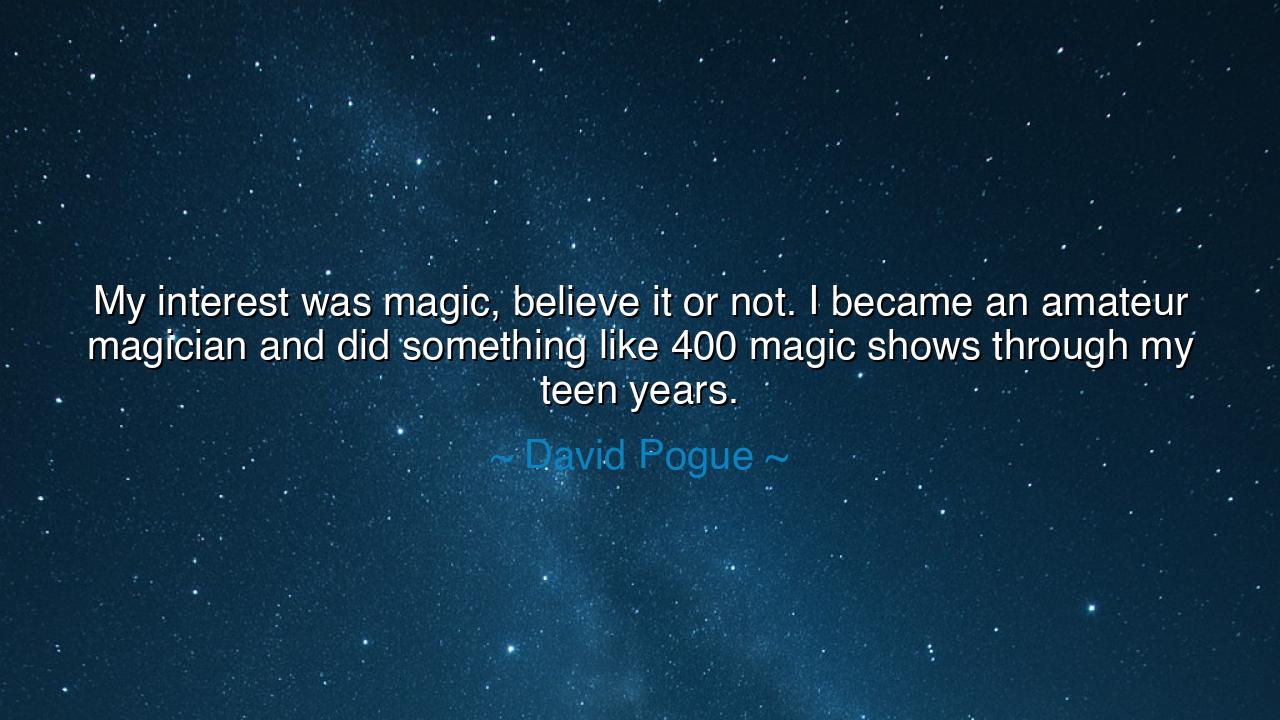
My interest was magic, believe it or not. I became an amateur
My interest was magic, believe it or not. I became an amateur magician and did something like 400 magic shows through my teen years.






When David Pogue declared, “My interest was magic, believe it or not. I became an amateur magician and did something like 400 magic shows through my teen years,” he revealed more than a childhood hobby. He unveiled the power of fascination and the drive of youthful passion. For in the practice of magic, a young heart learns not only sleight of hand, but also the art of wonder, of performance, and of bringing joy to others. His words remind us that the pursuits of youth, even when they seem whimsical, are training grounds for greater callings.
The origin of these words lies in Pogue’s journey before he became a writer, a journalist, and a technology commentator. In his youth, he was captivated not by machines or codes, but by illusions—the skill of transforming the ordinary into the extraordinary. Performing 400 shows demanded not only talent but discipline, courage, and persistence. In this, we see a deeper truth: what begins as play can become the forge of character. By embracing his fascination, Pogue honed qualities that later defined his career—creativity, confidence before audiences, and the ability to take complex things and make them feel like magic.
History, too, shows us how such youthful passions shape destiny. The young Leonardo da Vinci spent his early years sketching fantastical machines and studying the flight of birds. These were not idle amusements but the seeds of a mind that would later dazzle the world with inventions and art. In the same way, Pogue’s magic shows were more than tricks; they were rehearsals for a life spent captivating audiences, not with illusions of cards and coins, but with the marvels of technology and ideas. Passion in youth is never wasted—it is the compass that points toward the soul’s true north.
The image of a teenager performing hundreds of shows also speaks to the discipline hidden within delight. Many think of magic as effortless charm, but behind every illusion lies endless hours of practice, failure, and refinement. Here lies the lesson: joy and labor are not opposites, but partners. The joy fuels the labor, and the labor sustains the joy. What Pogue discovered as a magician is the same secret all masters of craft discover: repetition transforms talent into art, and art into wisdom.
His story also reminds us that the gifts we share with others magnify our own growth. By performing for audiences, Pogue learned not only skill but empathy—the ability to sense the hearts of others and bring them delight. This is the hidden strength of youthful pursuits: they bind us to community, teaching us that our talents are not for ourselves alone, but for the joy and enrichment of others. In this way, the stage of magic became a stage of life, preparing him to later translate the complexities of science and technology into wonder for the masses.
The lesson is clear: do not dismiss your youthful passions, for within them lies the map of your destiny. What excites your heart in youth may be the very force that carries you into your calling. Cherish it, cultivate it, and dare to take it seriously. Even if it seems like a game to others, it may be your training ground, your foundation, your fire.
So, children of tomorrow, take this teaching into your lives: whether your passion is magic, music, art, writing, or invention, follow it with both joy and discipline. Perform, practice, and share it with the world. For though you may not yet see its final form, every hour given to passion builds the person you are becoming. And one day, like David Pogue, you may look back and realize that the enchantments of your youth were not mere diversions, but the very stepping stones to your greater purpose.






AAdministratorAdministrator
Welcome, honored guests. Please leave a comment, we will respond soon